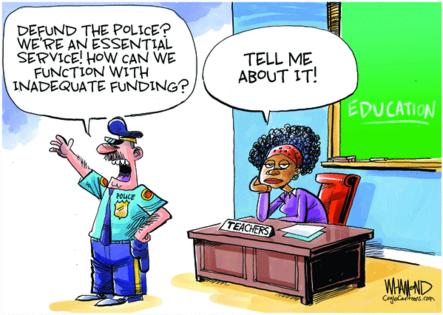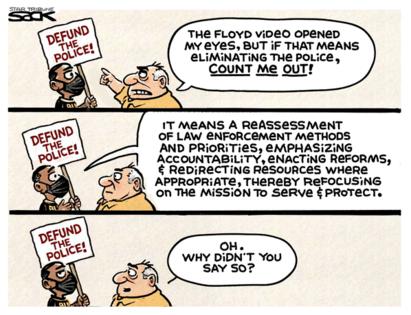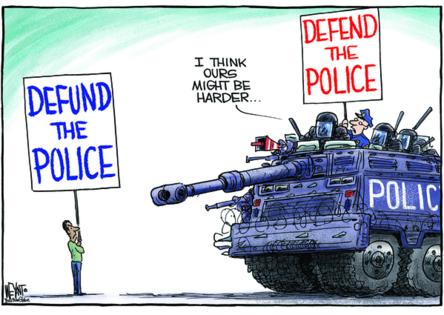Why Some Urban Planners Think We Should Defund Police
The tragically unnecessary death of George Floyd in Minneapolis in May, coupled with the COVID-19 pandemic, has forced us to come to a long-delayed reckoning of inequities in almost every sector of American life. From schools and healthcare to policing and criminal justice outcomes, no quadrant of our public debate has been off limits.
So it feels inevitable that, sooner or later, the discussion would descend on the very question of how we design our cities and towns. We already know, for instance, that housing and mortgage inequities are one of the biggest drivers of racial inequality and segregation in the country. And when the Divider-in-Chief starts blathering about saving the suburbs, it’s hard to ignore the racist bullhorn that’s being sounded.
In an extraordinary letter, close to 750 urban planners have called on the nation’s largest urban planning organization to support defunding the police, arguing that “neighborhoods that were racially segregated by a range of planning policies have become further denigrated by police violence and harassment of Black people.”
“Historically, planners have been responsible for manifestations of institutional racism including redlining and the construction of freeways and toxic industrial development in poor and Black and Brown neighborhoods, among many others,” the letter to the American Planning Association reads. “These actions have had reverberating effects, including creating the preconditions for over-policing of communities of color and disinvestment in community health and safety (just as they created the conditions for safety, wellness, prosperity, and limited policing in predominantly white suburbs).”
The planners point to the famed Vision Zero initiative, which aims to reduce or eliminate traffic fatalities.
Despite their seemingly good intentions, these programs “rely on police-led enforcement and may inadvertently direct additional resources to police” (As a matter of full disclosure, during my time as PennLive’s Opinion editor, we editorialized in favor of the program, as Harrisburg looked to reduce traffic deaths. The city took our editorial board up on that invitation. The more I read, the more I have come to reconsider that stance).
As CityLab reports, the letter also highlights “‘striking” disparities in life expectancy by ZIP Code. The planners argue that some funds now allocated to ‘hyper-militarized police departments’ could go to anti-racist planning efforts that advance best practices for ‘building affordable housing, creating accessible transit systems, promoting environmental justice, and advancing more equitable economic development.'”
Sara Draper-Zivetz, one of the planners who authored the letter, told CityLab that these disparities are one of the reasons that she and her seven, fellow co-authors do not belong to the nationwide group.
“We perceived this moment as an opportunity to pursue a conversation we’ve been needing to have for a long time,” Draper-Zivetz said.
APA President Kurt Christiansen told CityLab that the national group has “been listening thoughtfully to many voices during the past month and every thought shared has enriched our understanding of the nature and scope of the challenge, and informs our evolving thinking on how we can make a sustained, constructive impact as a large, complex and diverse association of planners.”
And while the APA hasn’t specifically spoken out on police defunding, it has decried police violence, saying in a May 31 statement that the “impact of Mr. Floyd’s death and other recent grave injustices like it must be viewed in light of the historical trauma inflicted on African American communities, including discrimination wrought by the planning profession itself, which led to structural disadvantages in housing, transportation, education and employment that last to this day.”
When people blithely dismiss systemic and institutional racism, point them to this discussion. Inequities are so thoroughly embedded that they’re even in the streets we walk on and the buildings we work in.
That’s why the work, the questioning, can never stop.
-
Copyright 2020 John L. Micek, distributed by Cagle Cartoons newspaper syndicate.
An award-winning political journalist, John L. Micek is Editor-in-Chief of The Pennsylvania Capital-Star in Harrisburg, Pa. Email him at jmicek@penncapital-star.com and follow him on Twitter @ByJohnLMicek.
Copyright 2020 John Micek, All Rights Reserved. Credit: Cagle.com












